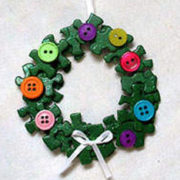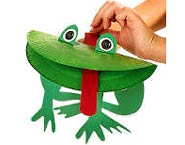QUESTION: Is it Fair for Kids to Make Wreaths and Ornaments in Public School?
People talk about it often. Separate of church and state. And around the holidays, the lines become garbled. Holiday concerts. Arts & Crafts projects. Holiday shopping. Given this yearly situation, my friend, who happens to be Jewish, posted a question yesterday on her personal Facebook page, that garnered 85 heated comments as answers:
Does it bother anyone else that in public school the kids are making wreaths and ornaments? Am I being too sensitive? I am so tired of fighting the same fight.
So…what do you think?It was a spirited, fascinating discussion. Some friends simply stated; “No, you are not being too sensitive” or “I would feel the same way.” Others recommended a more inclusive approach that called for representation and crafts from a variety of different religions while others felt there was no place for any of these religious symbols in school. Still others felt that these crafts had a definite place in school– especially when the majority of kids (while not all) celebrated Christmas.
I did chime in too. Here is my take:
“I certainly see the issue. It would certainly be more inclusive if there was a celebration and lesson plan around several of the holidays represented in the classroom.
When writing our Powerful Words character education program each year, I love to write in a section that allows children to talk about the holidays. I usually choose a word that allows for some grounding in discussion– whether it’s open-mindedness, tolerance, patience or friendship, I love providing curriculum that deciphers both similarities and differences within and between holidays and the way people celebrate.
For example; “last time we talked about having being open-minded to learning and trying new things. Today let’s use our open-mindedness to learn about the holidays people celebrate at this time of year. What are they (i.e. Christmas, Hanukkah, Kwanzaa)? What holiday do you celebrate? What do you do on your holiday? What do you eat? Favorite part? We may celebrate differently (even if they celebrate the same holiday!) but open-mindedness allows us to still learn from each other and be good friends!”
I then provide notes to the teachers about similarities and differences that children might find interesting. For example, the reasons why people celebrate the holidays are different but the way people celebrate can be similar (lighting candles, eating a meal with family, giving gifts, etc). It’s nice to allow for ways for the children to feel that they have something in common to unifyat this time of year.”
I’d love to hear your take. Should public schools do crafts and concerts that center around Christmas if the majority of the children celebrate this holiday? Should public schools do crafts and concerts that put any religious motifs at it’s center?
Or, should there be a definitive separation of church and state such that December lesson plans leave out holidays and just focus on winter?



 Are the children asking you about leap year? I know, as a parent, I get pelted with questions about just about everything! If you want to be ready– here are some answers to frequently asked questions about leap year:
Are the children asking you about leap year? I know, as a parent, I get pelted with questions about just about everything! If you want to be ready– here are some answers to frequently asked questions about leap year: Frog origami
Frog origami
 Joey, a seven year old boy with big brown eyes and a proven love for mashed potatoes did the unthinkable. Sitting around the holiday table, Joey wanted to show his Aunt Theresa that he could be part of the “clean the plate club” just like his Great Uncle Lester. With great conviction, he picked up his plate and licked it—sending his leftover turkey onto the floor, his unused gravy into his lap, and his mashed potatoes up his nose. Then he sneezed…and no, he didn’t cover his mouth or nose.
Joey, a seven year old boy with big brown eyes and a proven love for mashed potatoes did the unthinkable. Sitting around the holiday table, Joey wanted to show his Aunt Theresa that he could be part of the “clean the plate club” just like his Great Uncle Lester. With great conviction, he picked up his plate and licked it—sending his leftover turkey onto the floor, his unused gravy into his lap, and his mashed potatoes up his nose. Then he sneezed…and no, he didn’t cover his mouth or nose.